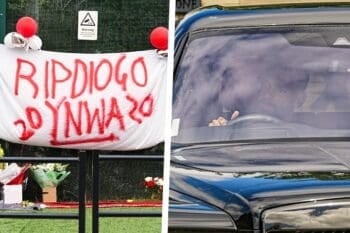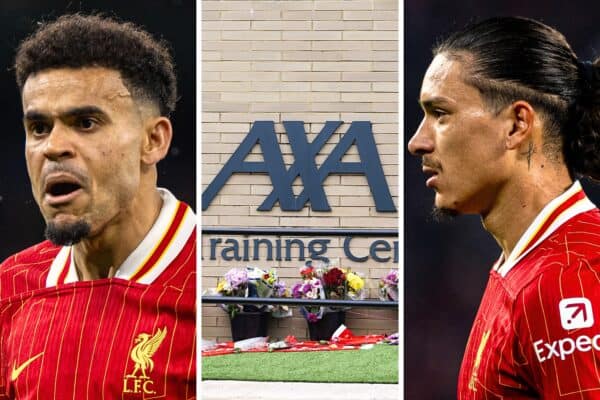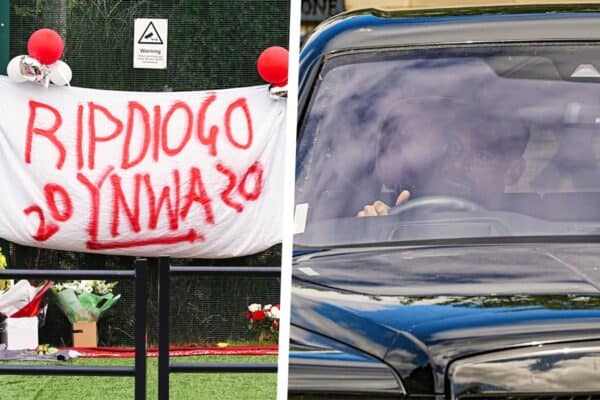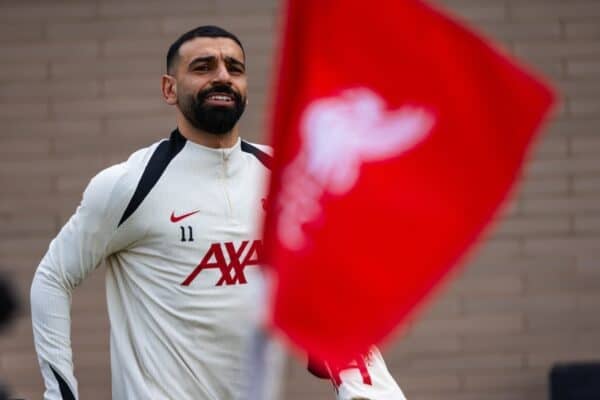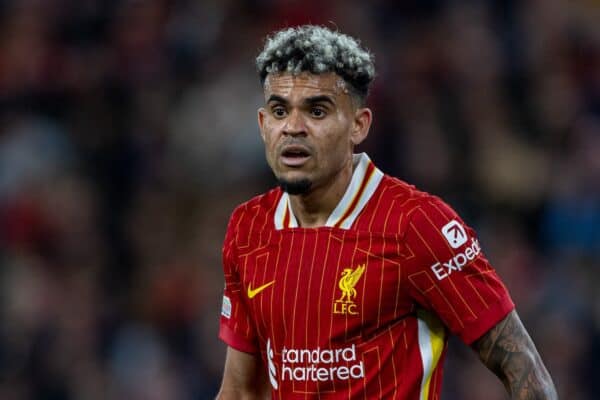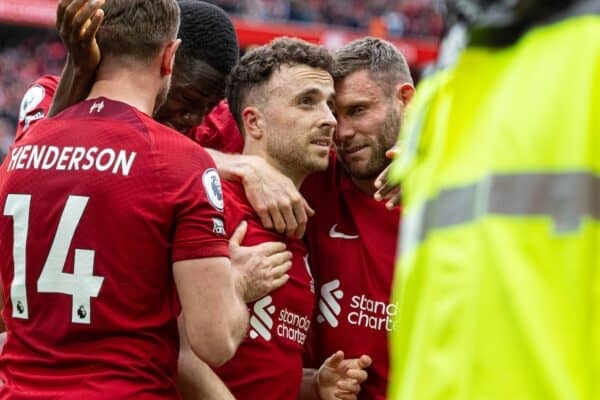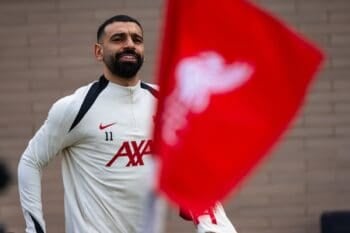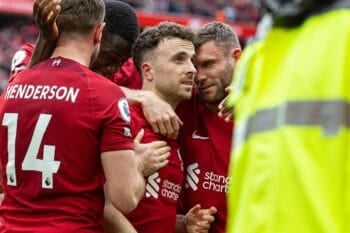Kopblog’s Gerry Ormonde continues his exclusive interviews with well known LFC authors, following on from the excellent Q and A with Tony Barrett, here Gerry interviews Tony Evans, a Liverpool supporter, The Times newspaper’s football editor and author of the book Far Foreign Land.
The book was actually released two years ago but it’s recently been re-issued so I’d no trouble picking up a copy. On my recent holiday, I sat down one sunny morning and began reading it and found it impossible to put down. It’s only about 140 pages long and in the hands of a lesser writer this might seem quite short, but Evans doesn’t bother with the usual pointless page-filling pre-amble you often get in similar such books and gets straight to the point, so one of his pages is probably worth three pages of anyone else’s.
In May 2005, he travelled to support Liverpool in the Champions League final the hard way and took an arduous five-day journey by train to Istanbul, without a match ticket! This book tells of his experiences on this journey but it also describes his experiences on the wider journey to Istanbul that began 20 years earlier and travelled through some dark places, such as Rome, Heysel and Hillsborough.
This is by no means a fluffy rose-tinted spectacle account about what it means to be a Liverpool supporter. The author is brutally honest about his experiences and I must confess that there were certain passages that I found quite unsettling, but perhaps the greatest compliment that I can pay this book is that three weeks after I’˜ve finished reading it, I find its still on my mind and I am still discussing it with friends.
 Welcome to Kopblog Tony and many thanks for taking the time to answer a few questions. Firstly, let me congratulate you on your amazing book, I’ve already read it twice and know that I’˜ll be pinching quotes from it for a long time to come!
Welcome to Kopblog Tony and many thanks for taking the time to answer a few questions. Firstly, let me congratulate you on your amazing book, I’ve already read it twice and know that I’˜ll be pinching quotes from it for a long time to come!
I’ve heard of people suffering for their art but an eight day train journey across Europe in often appalling conditions to get to Istanbul in May 2005, rather you then me mate! For those who haven’t had the pleasure of reading the book yet, can you tell us where the idea came from?
I’d written a very short piece about my mother and brother going to Rome in 77 by train and my sports editor remembered it. Now that really was appalling conditions but everyone on those trains will recall the trip to their dying day. Anyway, he thought it would be fun if I went to Turkey by train, revisiting the places me and Liverpool had been in the 80s. I jumped at it. I’m from the generation of Persil vouchers and Transalpino and love these journeys. By the way, the reason I didn’t go in 77 was a Commerce ‘O’ level. Passing or failing it had no effect on my life. My message to parents is that exams aren’t important, European Cup finals are. Yes, I’m still bitter.
 The real journey to Istanbul actually begins more then 20 years earlier and in the book you re-visit some of your experiences in the mid-80’s and take the reader to some dark places such as Rome, Heysel and Hillsborough. I found your first hand accounts of these events very unsettling, are you still haunted by those memories and considering UEFA’s continued disastrous handling of games, such as the CL final in Athens 2007, do you worry that there may be more such disasters to come?
The real journey to Istanbul actually begins more then 20 years earlier and in the book you re-visit some of your experiences in the mid-80’s and take the reader to some dark places such as Rome, Heysel and Hillsborough. I found your first hand accounts of these events very unsettling, are you still haunted by those memories and considering UEFA’s continued disastrous handling of games, such as the CL final in Athens 2007, do you worry that there may be more such disasters to come?
Definitely. Uefa is still putting big games into stadiums that are not equipped to cope with the crowds. In some respects, all-seater stadiums are more dangerous than terracing – when mass bunks take place, for example. Everyone’s standing but there’s an 18-inch trip wire in front of you – the seats. There are scores of problems Uefa need to address, from the corporate love-ins to ticket prices. The bottom line is that they treat the fans with contempt. We have emotional ties to our teams, but football’s rulers just see us as mugs to be fleeced for every penny. When they announced Moscow as a venue, my forlorn hope was that they’d get a Monaco v Porto type final with empty terraces and empty coffers.
As for being haunted by the memories, Hillsborough is the most difficult. None of us who lived through it will ever get over it fully. I’m still angry about 1984. Roma continue to stab and slash people. If a British club acted like they did, they’d have been closed down years ago. They are my second most hated club.
Heysel is more complex. I behaved badly that day. I was an angry, 24-year-old working-class boy who was determined not to suffer at the hands of ultras again. I never went with any thought of “revenge” – a word that’s cropped up over the years. What did I have against Juventus? If it would have been Roma I would have been looking for revenge, bloody right. I was wary and aggressive in Brussels, though. I’d seen Italian boys in action and wasn’t going to take any crap. Essentially, I was on a hair-trigger. There were a lot like me.
I hate all this stuff claiming it was Londoners, England hooligans or a National Front mob who caused the problems. If any of those people would have shown their faces, they would have been seen off pretty quickly. The reason people died was that a wall collapsed. But a chain of events led up to that point that, had any link been taken out, they would have gone home alive. The behaviour of some of our fans – me included – was a big link in that chain.
People are critical of me for saying this. Loads of people went, weren’t aggressive and saw none of the hostile undercurrent, I know. My mother, my youngest brother and my sister – both barely teenagers – were there and they did nothing to feel blameworthy about. My other brother was with me and was disgusted by how me and members of our group acted. We did nothing violent but were boorish, aggressive bullies. There were too many like me that day and it was very different behaviour from our usual demeanour in Europe.
I took the ordinaries to matches, drank in the Yankee and the Wine Lodge and moved in matchgoing – away matches, that is – circles. It wasn’t a hooligan culture but they were different days. It was a time of confrontation – picket lines, the city council, Troops Out marches – and that doesn’t even take into account going the match and bumping into the idiots looking for Scouse blood.
After I wrote about Heysel for the paper, someone on RAWK suggested I was an Evertonian making it up. I suppose this is a longwinded way of saying that the denial haunts me more than what I did. I wasn’t so bad. I was just a prick. But I did play a very, very small role in something that ended up with people dead.
For a lot of people, it seems to me, there wasn’t even any empathy until after 1989. Now there’s a new generation who think Heysel was nothing to do with us. It was. At least some of us.
Travelling long uncomfortable train journeys across Europe to get to a game is rapidly becoming a thing of the past, with most fans these days either preferring to catch a plane to the match, or to stay in the comfort of their own home and watch the game from 57 different camera angles on the likes of Sky Sports. So are the type of passionate fans who made those long arduous treks to support the team throughout the 70’s and 80’s also becoming an endangered species in the modern game?
Yes. It will get worse. People are not forming the bonds with the clubs that we have. When I was 9, I’d go up the ground for 12, be first in at one and hanging over the fence at the front of the Anny Road for the rest of the afternoon. When Stevie Heighway took a corner, I could hear him grunt when he hit the ball. I was there, I could touch the atmosphere, was part of it. Why do I still love it? It’s because of that. Because I believe it’s my culture. Because it’s part of my identity. Can you get that from a telly?
The same with being at games. Even when you lose, you have adventures you can talk about for decades – you should come out and be bored by me an my mates still abusing each other about incidents half a lifetime ago. What adventures can you have in front of the television?
 Towards the end of the book you gave a stark warning of the dangers foreign investors and the games globalisation might have on the traditions of a club such as ours. This was pretty prophetic considering you wrote the book three years ago, long before the sorry day that George Gillett and Tom Hicks took over at Anfield. What have you made of this whole ownership mess and could it have been avoided if some proper homework had been done on these Americans?
Towards the end of the book you gave a stark warning of the dangers foreign investors and the games globalisation might have on the traditions of a club such as ours. This was pretty prophetic considering you wrote the book three years ago, long before the sorry day that George Gillett and Tom Hicks took over at Anfield. What have you made of this whole ownership mess and could it have been avoided if some proper homework had been done on these Americans?
I feel angry and impotent. The last thing I’m interested in is who owns a club. I want what they want – to win – but for a completely different reason. They want it because it makes them money, I want it because it makes the people happy. The club was owned and run by small men with no vision or ambiton and they made it easy for the Americans . Why did Rick Parry not see what Arsenal‘s directors saw: that a new stadium could make the club financially secure and all it would take was a relatively small loan and some balls? And then, to sell to men who would be exposed as dangerous by a google search? It frightens me. Nobody takes into account how important football clubs are to communities, what they symbolise, what they mean. Least of all the people who own the club now. These are dangerous times.
If there is a positive side to this mess, the adversity has had a unifying effect on Reds fans with massive public shows of support for the manager, supporter groups such as the ‘œSon’s of Shankly’ (I just love that name) emerging and aiming to preserve the traditions of the club, and Rogan Taylor’s, Share Liverpool Scheme which is attempting to raise enough capital from supporters to put control of the club in the hands of the fans, what a wonderful idea! Have these things given you encouragement for the future?
I’m impressed by the energy and creativity of our support. It’s always been there – football culture as we know it was shaped by our boys, after all. As well as that, the Reclaim The Kop innitiative was a step in the right direction. The Union can only be a good thing but everyone needs to get involved, no matter where they come from. There’s been a growing gap between the young Scouse fans and out-of-towners. It needs to be closed. I see the club as part of my Scouse heritage but, as far as I’m concerned, supporting Liverpool is right and proper wherever you’re from. Unity is crucial at the moment. Resist, resist, resist. Togetherness is just about the only weapon we’ve got.
Sadly, though, I don’t think the Share Scheme will work. Too much cash at stake. But the great thing is that people care enough to try.
As a journalist, does being a lifelong Liverpool fanatic make it difficult for you to remain neutral on reporting on the issues affecting the club and does the internet play an important role in keeping you in touch with fans opinions?
I came to journalism very late and have had no training. So you don’t get the same level of professionalism with me. No, seriously, it can be hard sometimes. I was editing The Game, The Times’ Monday football supplement, when Rio Ferdinand scored in the last minute at Old Trafford. I had to pick the picture for the front, write the headling and write ‘The Game says’ comment. All I wanted to do was lock myself in a darkened room. Moscow was hard, too. But I’d defy anyone to see who we support reflected in the paper, except when I write pieces which clearly identify me as a Red.
The internet’s great. I don’t really need it to keep in touch with fans’ opinions – my mates, who I’ve been going with for 25 years, let me know. And my brother’s never off the phone. If we get it wrong, I hear about it quick. When Martin Samuel – the best football writer bar none – misheard the “Inter” chant as “England” in Milan, my phone went crazy. I got off the plane and turned it on and couldn’t believe the number of texts waiting for me. I blamed the people in the office who let it get into the paper. After all, they work with me every day and hear plenty about Scouse separatism.
But I do love the sites. The energy, invention and wit do us proud. I only became aware of them after the book came out and now am never off them.
Even in the old glory days, Liverpool have never enjoyed the type of positive media image that seems to be reserved for the likes of the mancs and the gooners etc. All clubs suffer from negative press from time to time, but it sometimes seems to me that there are certain press and TV reporters who seem to take an extra bit of relish in putting the boot into our club at every opportunity. As someone who earns their living in this media, is this a view that you share?
No, I come from the opposite point of view. We’ve got so many friends in the media. There are Liverpool supporters everywhere in the sports departments and a lot of the writers have a soft spot for us. Of course there are always a few who come from the opposite angle, but by and large we’re well thought of. Sports department have traditionally treated the club and fans better than the front ends of the papers have treated the city. The number of writers who tell me how much they love going to Anfield never ceases to amaze. Our fans get great publicity. The thing is, we always remember the negative stuff.
Every set of fans think the media hates their club. There’s probably someone on Red Issue now saying The Times is biased against United because the football editor’s a Kopite. Well I am on a personal level but not professionally. The thing is, certain clubs are more newsworthy. We’re one of them. So there’s more coverage, both positive and negative, than you’d get for a small club (just to clarify for our Evertonian friends, I’m thinking of Stoke. Honest).
And there are times when every club attempts to deflect criticism by blaming the media. They blast you for a piece, saying it’s made up, even though they’re the people who gave you the story in the first place.
Rafa Benitez had a massive rebuilding job to do at the club when he arrived. When you consider that the constraints of his transfer budgets meant that we missed out on signing such players as Alves, Simao and Vidic etc, I firmly believe that if he had access to the kind of funds that are enjoyed by his rivals at the other top sides, we might already have won the Premiership by now and a lot more besides. But season after season he has been making increasing progress with the first team and we also now have a successful reserve side full of exciting young prospects for the future. Do you get the feeling that we could be on the verge of something great again and could Benitez turn out to be a Shankly of the modern age?
I’m very wary of Shankly comparisons. I seem to recall “Are you Shankly in disguise” being sung to Houllier.
Rafa is his own man, with plenty to recommend him. He can be frustrating but he delivers success. Istanbul, the FA Cup, another final in Athens and a Riise brain fart away from another. Those who call for him to be sacked are deluded. He is very focused, ruthless and is a winner.
Last season was a disappointment but he was hanging on to his job by his fingernails for half of it. As for needing more money, he’s had plenty. The problem has been more about how he’s been allowed to use it. He feels his transfer policy has been obstructed. If he’s free to do as he pleases, he believes he will get the right people in.
With the fantastic Torres, the exciting Babel and the impressive Skrtel among others, successfully added to the team last season, what or who do you think needs to be added over the summer to make us serious contenders, or indeed even potential winners, of next seasons Premiership?
I would have liked to see some pace and width in the midfield. Gareth Barry is a good player and will strengthen the squad but we may have to rely on the full backs for width.
We have a fine spine and Babel will be better next season and play more. Skrtel’s great and Torres is class. And we’ve also got some fella from Huyton who can play a bit. Gerrard still has untapped potential. I’ve been critical of him over the years, but he’s one of the best midfielders in the world. Mascherano, if he can add a little more tactical nous and positional discipline to his game, will play a big role.
I suspect that without the boardroom upheaval, we’d have been much closer this season. But it really is house in order time.
Next year is an emotional year for us. It will be a difficult spring. It would be nice to bring home the title and dedicate it to the 96. Now that I’ve said that, it seems so trite. But, like I tried to illustrate in the book, there are so many emotions tied up with every ball that’s kicked, so many unresolved issues that hang across the decades. The title would be wonderful but justice would be better. Both would be the answer to a middle-aged man’s dreams.
Far Foreign Land is available at http://www.farforeignland.co.uk/buy.html and the Hillsborough Shop, £1 is donated to the HJC for every copy sold.


